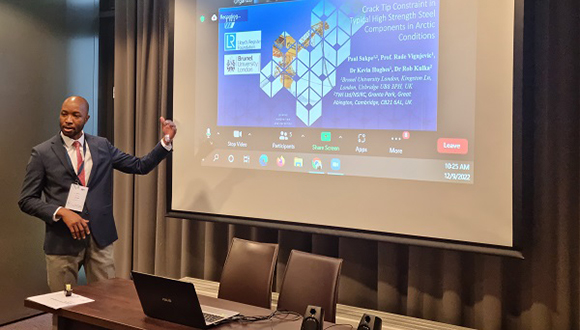Fri, 13 January, 2023
Held in Berlin, Germany, the conference was organised by the STECONF in partnership with Scientific Research Publishing (SCIRP). Talking about his experience, Paul mentions how his studies at NSIRC enhance his conference experience.
"For me, it was a great confidence booster to have presented in an international conference thanks to my previous presentations at NSIRC conference. It was exciting to discuss my work in detail with diverse groups of people, mixing industry with academia, particularly the impact my research will have on my future career."
"It was a joy to learn more about the research of other participants too, and most of all, it provided me the avenue to network. Some people I spoke to applauded my research in industry with the many benefits it adds to ones thesis and experience."
"Berlin was lovely. The last day of the conference was an organised guided tour within the city where I learned a lot about it's rich history."
 Paul presenting his research at the conference in Berlin. Photo: Paul Sukpe
Paul presenting his research at the conference in Berlin. Photo: Paul Sukpe
Constraint-Based Failure Assessment Diagram (FAD) for Fracture Assessment of API 5L X65 Steel Grade Pipe at Low Temperatures.
Paul's project investigates the application capability of the FAD approach for the assessment of cracked pin-loaded single edge notched tension (SENT), and three-point single edge notched bend specimens at low temperature (-120℃).
The research utilises the structural assessment of low constraint structural components, using fracture toughness data obtained from deeply notched fracture specimens may be safe, but overly conservative, which may result in unnecessary maintenance time and costs.
In this regard, the transferability of the fracture toughness obtained from a laboratory specimen to an actual cracked structural component becomes an important issue in structural integrity assessments based on two-parameter fracture mechanics methodology.
The results of the study will help the industry with the refinement and enhancement of the current defect assessment procedure, BS 7910 which provides safe but conservative assessments, and increase safety margins for the defect assessments.
Paul's doctorate degree is awarded by Brunel University London and sponsored by the Lloyd's Register Foundation.
His research is supervised by a panel of industrial and academic supervisors consisting of Dr Rob Kulka, TWI Section Manager, Asset Integrity Management (AIM), and Prof Rade Vignjevic and Dr Kevin Hughes from Brunel University London.
Paul's Presentation to the NSIRC Research & Innovation Conference 2021